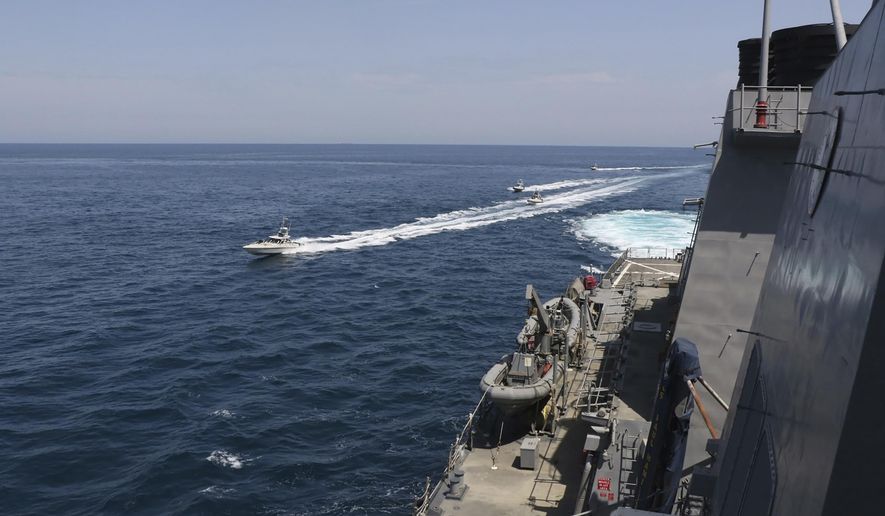OPINION:
Despite being the epicenter of the coronavirus pandemic in the Middle East, Iran last week began easing physical distancing restrictions. Officials in Tehran also lifted the ban on travel between cities and re-opened “low-risk businesses,” while Iranian state TV showed scenes of crowded streets and packed buses and trains.
The ruling clerics clearly felt the pressure to risk their citizens’ lives to relieve the economic pain.
Iran’s economy has been in free fall since the Trump administration re-imposed sanctions after withdrawing from the 2015 international nuclear deal in 2018, a deal which — due to bipartisan opposition that included Democratic minority leader Sen. Chuck Schumer — never became a binding treaty.
Iran rejected the subsequent U.S. offer to negotiate lifting sanctions in return for a new agreement which would remove the 2015 deal’s “sunset clauses” and address what the U.S. said were Iran’s state-sponsored terrorism and illegal ballistic missile programs. Instead, Iran demanded a return to the flawed Joint Comprehensive Plan of Action (JCPOA) as a precursor to any new talks and is trying to blackmail the international community by continuing to develop its nuclear and ballistic missile programs and back its proxies, including Hezbollah, the Assad regime in Syria and Yemen’s Houthis, against U.S. allies.
Iran began escalating attacks on the U.S. and its allies in the summer of 2019 by attacking oil tankers in the Gulf; seizing the Stena Impero oil tanker; shooting down a U.S. drone; and launching a missile attack against Saudi Aramco. The rising clashes in Iraq — including attacks by Iranian-allied militias on U.S. military and diplomatic sites, the U.S. killing of Iranian Gen. Qassem Soleimani near Baghdad, and a retaliatory strike by Iranians against two bases housing U.S. troops this year — only fueled the tension.
President Trump’s new order just this week to “destroy” small Iranian craft brazenly harassing U.S. Navy vessels in the Strait of Hormuz was just the latest sign of rising Iranian intransigence.
In July 2019, Iran began exceeding the limit on its stockpile of low enriched uranium set under the JCPOA, citing the U.S. withdrawal from the deal. Iran has also nearly tripled its stockpile of enriched uranium since November 2019, also in violation of the JCPOA, according to the U.N. International Atomic Energy Agency. Iran’s current stockpile brings it dangerously close to the amount needed to produce a nuclear weapon.
Iran has claimed every measure was reversible — if the U.S. sanctions were lifted.
Iran is facing justifiable international opposition to its request from the International Monetary Fund for a $5 billion loan, which Tehran claims is needed to fight the coronavirus.
Iran rejected the Trump administration’s offer in February of humanitarian assistance, formally conveyed through the government of Switzerland, which included “broad exceptions and authorizations to its sanctions for the commercial export of food, medicine, medical devices and agricultural products.”
But a $5 billion IMF loan would only free up Iran’s scarce budget resources to finance new nuclear and ballistic missile development as well as the terrorism, which fuels ongoing sectarian violence in the region and beyond.
The global community has an interest in helping innocent Iranians receive the medical care their own regime denies them. Iran’s inept response to the coronavirus risks spreading the pandemic further in the region and beyond. But trusting that any significant amount of new money would be put to proper use is senseless when Iran’s past behavior offers no assurance whatsoever this would be the case.
Iran’s demand for sanctions relief and now a $5 billion IMF loan do not come without risks for the ruling clerics. For months before the onset of the coronavirus pandemic, brave Iranians protested against their government’s graft and malfeasance, protests that reached a crescendo after Iran’s military mistakenly shot down a Ukrainian jetliner in January, killing all 176 passengers on board.
The international community should offer Iran assistance — not in cash but in kind. Send ventilators, CT scanners and protective gear, all under close international scrutiny.
The coronavirus has exacerbated the economic pressure on Iran’s brittle autocracy. But there is nothing to be gained by letting Iran’s leaders evade the choice they must make between military aggression and providing for their people. Now is the time for the international community to hold firm and do the right thing.
• Daniel N. Hoffman is a retired clandestine services officer and former chief of station with the CIA. His combined 30 years of government service included high-level overseas and domestic positions at the CIA. He has been a Fox News contributor since May 2018. Follow him on Twitter @DanielHoffmanDC.




Please read our comment policy before commenting.